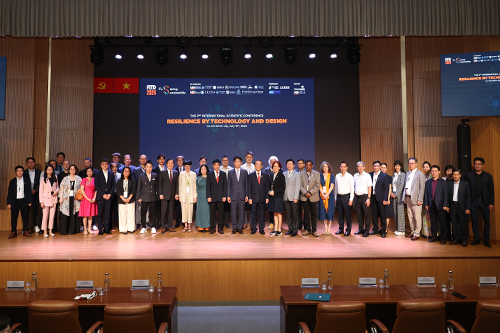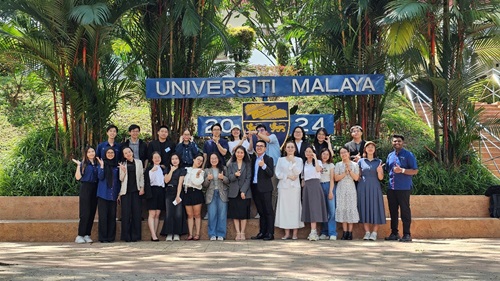
JST Seminar Talk in March with “Critical Perspectives on Leadership” Theme
On March 30th, 2022, JABES successfully organized the first seminar talk in the plan to organize the JABES Seminar Talks (JST) series in 2022 on “Economics and Business: Agendas for the Uncertain World”. The JST Seminar Talk in March with the theme “Critical Perspectives on Leadership” presented by Prof. Mark Learmonth (Nottingham Trent University, the UK, Editor-in-Chief of Human Relations Journal) attracted more than 50 researchers domestically and from various countries (India, the Philippines, Indonesia, Pakistan, Nigeria, China) to attend online.
Ascending the success in 2020 and 2021, the seminar talk series on “Economics and Business: Agendas for the Uncertain World” in 2022 was held by JABES and started with the seminar talk in March with “Critical Perspectives on Leadership” Theme.
Prof. Mark Learmonth is a professor at Nottingham Trent University, the UK. Before being recruited for Nottingham Trent University, he worked for diverse huge higher education institutions listed as Durham University, University of Nottingham, and University of York, and in the first 17 years of his career, he worked in diverse manager positions in the field of Health Services in the UK. Most of his research involves management, management based on evidence, evidence and theories in management research, and methodological debates. Currently, he has mostly interested in evaluating the use of means of communication in identifying managers, the varied nature of language in the process of management used to represent work and organizations, and multi-ethnic studies research methodology, especially in the modification of the society.
In the seminar talk, Prof. Mark Learmonth focused on presenting his research and raised perspectives on the differences between the terminology of leading and managing as well as the roles of leadership. From his sharing, the terms “leadership” or “leader” are used simply as synonyms of the terms “manage” or “manager” traditionally. Most of the classic leadership theories suppose that a leader differs from a manager in which the largest difference is placed on their missions. The job of a manager is to get to know well administrative and notary work and instruct their staff while “leaders” are those who inspire their subordinates. The term “leader” is assumed along with valuable attractions and honored social principles. The two terms “leadership” and “leader” are used more commonly, however, within many organizations, the regularity of calling “bosses” “leaders” affects the assumptions about the authority and power at workplaces. Simultaneously, the language of leaders stresses and causes the inequality between those who hold power and their “followers” and, therefore, negates the benefits of laborers.
Laborers are described as boring bureaucratic employees while leaders mean those who play the role of leading and connecting them so as to together aim for general goals. In the 50s and 60s, “management” was a common term mentioning the job of managers. However, in the 21st century, research on management theory uses the term “leadership” to generally refer to those who work as managers. Prof. Mark Learmonth assumed that it is necessary to have a new term referring to leaders, who play an important role in building brands and are able to inspire, lead, and be recognized by the whole team.
Besides, Prof. Mark Learmonth mentioned the significance of leadership capability in constructing and operating an organization to achieve expected targets. Leading is crucia; however, one more important factor is teambuilding, the participation of employees, the transparency of information, and especially using correctly the competencies of the whole labor force but not only the leaders of organizations.
The seminar talk took place excitingly with a number of discussion ideas and contributions about the differences between the concepts of manager, boss, and leader.
Additionally, with the aim of providing the researchers with the next research orientation, Prof. Mark Learmonth questioned that managers were leaders but which criteria we should use to assess whether those leaders were working correctly or not was an unanswered question requiring further supplementary research.
Additional photos related to the seminar:
.jpg)
Dr. Huynh Luu Duc Toan sending his greetings to Prof. Marl Learmonth and all participating scholars
.jpg)
.jpg)
Prof. Mark Learmonth presenting his research
.jpg)
Prof. Mark Learmonth answering discussion questions raised during the seminar
.jpg)
The participant attending the discussion session
.jpg)
Prof. Nguyen Trong Hoai showing his gratitude to Prof. Marl Learmonth and the participating researchers
Further information:
All information relating to JABES and outstanding events listed as the International Conference ACBES 2022, the JST Talk series, and so on, will be updated continuously on the official portal of JABES as follows:
JABES Facebook: https://www.facebook.com/jabes.ueh.edu.vn
JABES Website: http://www.jabes.ueh.edu.vn/
JABES on Emerald Group Publishing: https://www.emeraldgrouppublishing.com/journal/jabes
ACBES Website: https://acbes.ueh.edu.vn/
JABES Youtube: http://shorturl.at/jnoOR
News, photos: JABES

![[Podcast] Does the Financial Flexibility Prevent Stock Price Crash Risk during COVID-19 Crisis? Evidence from the Vietnamese Stock Market](https://en.ueh.edu.vn/images/upload/thumbnail/ueh-thumbnail-114718-071624.png)
![[Podcast] An Evaluation Of Two Business English Course Books, Business Partner B1+ Business Partner B2: Students’ And Teachers’ Perspectives](https://en.ueh.edu.vn/images/upload/thumbnail/ueh-thumbnail-113649-071624.png)


![[Podcast] Latest approaches for sustainable universities](https://en.ueh.edu.vn/images/upload/thumbnail/ueh-thumbnail-042022-071224.png)